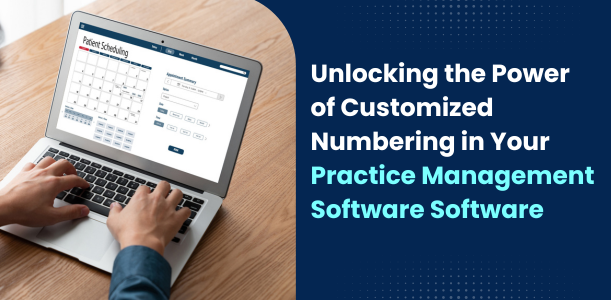
- Customizing Numbers for Optimal Clinic Management:
The ability to customize numbering within your PMS presents a unique opportunity to prioritize clinician time and optimize patient information handling. By crafting a system that utilizes essential data points like patient number, case number, and episode number, you can create an intuitive numbering system that benefits both staff and patients alike.
Imagine starting with a number like “23001” for the year 2023. Instantly, you can identify when the patient’s episode began. But let’s take it a step further and harness the power of alphanumeric characters to add more context to the number.
Example: “BRC23001HNDOT” – Decoding the Number:
- B: The patient has Blue Cross Blue Shield (BCBS) insurance.
- R: Referral required for this patient.
- C: Collect a copay from the patient.
- 23001: The patient’s episode started in 2023.
- HND: The patient is being treated for a hand condition.
- OT: The case belongs to the Occupational Therapist (OT).
Benefits of Custom Numbering:
a. Enhanced Scheduling Efficiency: With a quick glance at the number, you can identify the patient’s insurance, referral status, copay requirement, and treatment specifics. This empowers you to efficiently allocate time slots and combine appointments for maximum clinic productivity.
b. Seamless Patient Care: Knowing that this is an OT case, the clinician can access relevant information and tailor their treatment approach accordingly, avoiding confusion and ensuring accurate record-keeping.
- Unlocking Productivity with Alphanumeric Codes:
The possibilities of customized numbering are virtually limitless, and you can create unique codes for different patient scenarios, all aimed at optimizing your practice workflow.
Example: “M23001BCKPT” – Decoding the Number:
- M: The patient is covered by Medicare.
- 23001: The patient’s episode started in 2023.
- BCK: The patient is being treated for a back condition.
- PT: The case belongs to a Physical Therapist.
Example: “C23001PT” – Decoding the Number:
- C: The patient is a cash-paying patient.
- 23001: The patient’s episode started in 2023.
- PT: The case belongs to a Physical Therapist.
Benefits of Alphanumeric Codes:
a. Streamlined Scheduling: Customized numbering allows your team to quickly discern patient details, enabling efficient appointment management and avoiding scheduling conflicts.
b. Personalized Patient Care: Clinicians can easily identify patient conditions and tailor treatments accordingly, leading to improved patient outcomes.
Conclusion:
Incorporating customized numbering within your PMS scheduling module unlocks a world of possibilities for your medical practice. Beyond traditional patient numbers, alphanumeric codes provide vital insights into insurance, referrals, copay requirements, and treatment specifics, streamlining scheduling and enhancing patient care.
By leveraging this powerful feature, your practice can achieve heightened efficiency, reduced administrative burdens, and an overall improved patient experience. Embrace the potential of custom numbering and let your imagination guide you in creating a system tailored to your clinic’s unique needs, ultimately leading to increased productivity and success.

